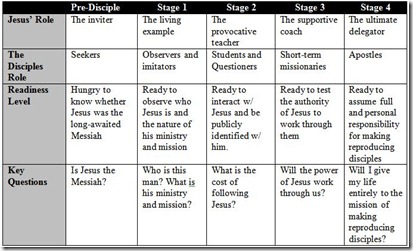We often think about discipleship being only for believers, but what about discipleship and the unbeliever?
Is there such a thing as discipleship for the unbeliever? Can unbelievers be discipled?

To hear some Christians and pastors talk about it, discipleship begins the moment a person believes in Jesus for eternal life. One of the first steps of discipleship, we are often taught, is baptism, and disciples of Jesus should also get involved in a community of believers, tithe, pray, and attend a Bible study. These sorts of things are what often characterizes a true disciple of Jesus Christ. Since most unbelievers do not do such things, it makes no sense to talk about discipleship and the unbeliever.
I want to challenge that idea. I believe unbelievers can be discipled and should be discipled. Though most of discipleship is for believers, there are also numerous aspects of discipleship for the unbeliever.
Reconsidering Discipleship and the Unbeliever
If current followers of Jesus sought to engage in more methods of discipleship with the unbeliever, I think we would see more people believe in Jesus for eternal life, and thus, more people become fully devoted followers of Jesus. But when we say, “Our first task to to convert people, and after that, the process of discipleship begins,” we neglect a vital and critical element of the evangelistic process.
Here are three reasons why we should practice discipleship with unbelievers.
The Definition of “Discipleship” and the “Unbeliever”
When it comes to the issue of discipleship and the unbeliever (and almost any other issue of theology as well), it is essential to define the key terms. In this case, what is meant by “discipleship” and the “unbeliever”?
Discipleship is the process or act of learning to become like someone else. It is roughly equivalent to the terms “student, learner, or follower,” though my favorite synonym is “apprentice.” When we think of discipleship as only being a student or learner, we usually think of sitting in a classroom or auditorium and listening to someone lecture at us while we listen attentively and take notes.
The idea of “apprentice” however, includes not just learning about something, but also doing or practicing what is learned. Discipleship is following someone around to learn from them, observe them, so that the learner can ultimately do the same things as the teacher. The disciple, when fully trained, is just like the teacher. The word “apprentice” carries this idea best.
Notice, of course, that apprenticeship can begin before a person really knows anything about the trade or craft they are trying to learn. Someone can even be an apprentice even if they are not certain they want to practice that trade or craft for their entire life. Some people become an apprentice as a way of testing the waters.
So when it comes to discipleship and the unbeliever, it seems logical that an unbeliever could seek to learn from Jesus and become more like Jesus in his or her life, before they ever make the commitment to follow Him completely, and definitely before they come to believe in Jesus for eternal life. Discipleship can be a way for an unbeliever to try to figure out who Jesus is, what He teaches, and what it means to follow Him.
This becomes even more true when we seek to define the term “unbeliever.”
The term basically means “someone who doesn’t believe.” Based on this definition, no one is technically an “unbeliever” for everybody believes something. When speaking about “unbelievers” we need to ask “Unbeliever about what?”
Yet even when it comes to issues related to God, Jesus, sin, the Bible, and a whole host of other Christian teachings, there is nobody is a true “unbeliever.” Even someone who is an atheist is likely to believe that there was a man named Jesus who lived 2000 years ago who died on a cross at the hands of the Romans.
Obviously then, he term “unbeliever” is relative. Everybody believes something.

So again, when we talk about discipleship and the unbeliever, we can see that no matter what a person believes or doesn’t believe about God, Jesus, sin, Scripture, and a whole host of other Christian teachings, there is always room for us to talk with a person about what they believe (or don’t believe) and hopefully bring them to a place that is somewhat closer to the truth revealed through Jesus Christ and in the Scriptures.
And if we help someone to believe a truth about Jesus (or God, Scripture, etc) that they didn’t believe before, does this not cause them to learn about Jesus and follow Him a little closer than before? Is this not a form of discipleship? Of course it is!
In some sense, it could be argued that everyone is following Jesus.
But the fact that we can engage in discipleship with the unbeliever is also seen in the very life and ministry of Jesus Himself.
Jesus Engaged in Discipleship with Unbelievers
Jesus is the best example of how to perform discipleship, and it is fairly obvious from a quick reading of the Gospels that Jesus engaged in discipleship with unbelievers.
Don’t believe me?

Tell me, was Judas a disciple of Jesus? Of course he was! He is frequently referred to in the Gospels as a disciple, and specifically, one of the Twelve.
Then there are all the multitudes of people who followed Jesus around to listen to His teachings and receive His healing and observe His miracles. John 6:60-66 (and other texts) reveals pretty plainly that many of these people who followed Jesus — who are called “disciples” — did not believe in Jesus, that is, they were not “believers.” They were disciples and unbelievers.
This alone should show us that it is not impossible to talk about discipleship and the unbeliever. Jesus discipled unbelievers, and let them follow Him, and taught them, and trained them, and called them to an ever-increasing faith and obedience to Him and His way. Some turned away and stopped following, while others continued to follow Him.
Even then, none of His disciples fully believed everything Jesus said. Judas, of course, we have already talked about, but prior to the death and resurrection of Jesus, not even Peter, James, and John believed that Jesus would die and rise from the dead. So in a sense, when it came to the death and resurrection, all of the disciples were “unbelievers.” (See my message on the Six Denials of Peter.)
Discipleship is a Process
All this points to the fact that when it comes to discipleship and the unbeliever, there really is not “beginning” point of discipleship, just as there is no end point either.
No honest disciple of Jesus ever thinks they have “arrived” and have become a perfect and fully-devoted follower of Jesus Christ. Discipleship is always a process. It never ends.
It also seems that discipleship never really begins either. The only real “beginning” of discipleship is the moment of physical birth. At that point, the Spirit of God begins to draw us, pull us, and woo us toward Jesus. Our parents, whether they were “Christians” or not, begin to teach us things about God and this world (even if they weren’t around and even if they taught us horrible things, they still teach us). This too is an aspect of discipleship.
As we grow, we adopt a worldview about the universe, humankind, what is important in life, and what happens after death. All of this is an aspect of discipleship.
It’s not a matter of who is in and who is out, but is an issue of proximity to Jesus. Someone is a disciple of Jesus if they are being drawn closer to Him daily.
One book I read a while back which presents this idea well is The Critical Journey by Janet Hagberg and Robert Guelich. They somewhat argue that the journey of faith doesn’t really begin until a person recognizes the existence of God, but even then, this point of faith is long before a person actually believes in Jesus for eternal life and becomes what we might call a “Christian.”
Another book I have read on this is Transforming Discipleship by Greg Ogden. Here is a chart that comes from his book which shows the connection between discipleship and the unbeliever.

You can see that he refers to people who haven’t believed as a “Pre-Disciple” but the point is fairly clear that to get a “Pre-Disciple” to become a disciple, you need to engage in discipleship. In his chart, you want a Pre-Disciple to believe that Jesus is the Messiah. How would you get a person to believe that? Through discipleship!
Why does it matter?
If you have hung here, you might be wondering, “Why does it matter?”
Here’s why:
People make discipleship way too difficult. Discipleship is often thought of as this magical and mysterious process by which a new believer gets transformed into this miracle-working Saint.
But there is nothing magical or mysterious about discipleship. There are no secret steps or secret handshakes. You learn to follow Jesus the same way you learn everything else: you spend time doing it.
And as long as we put up this artificial barrier between “believers” and “unbelievers” we end up focusing most of our time and effort on believers. We hold Bible studies for them. We do training sessions for them. We have get-togethers for them.
But as soon as we dump the barriers to discipleship (“Oh, you can’t come to this group until you become a believer”), then everyone is welcome at any time. As soon as we realize that discipleship is not just for believers, but is for everyone, then we can begin to realize that discipleship is not program or a church activity, but is a way of life.
We are always learning and always teaching. We are engaged in discipleship with unbelievers when we talk to friends at lunch. When we interact with our neighbor over the fence. When we behave with honesty and integrity at work. All of this is discipleship, both for us and for those with us.
In the end, I believe that pondering the issue of discipleship and the unbeliever actually enables us to understand discipleship better, and helps us live as better disciples of Jesus Christ.
What are you thoughts about discipleship and the unbeliever?




 To learn about this world we live in, there are a variety of things we can do, but every Christian must be doing something to learn about people we are trying to reach. Though the best way to do this is with developing personal relationships with people, one quick way to learn is through blogs and websites.
To learn about this world we live in, there are a variety of things we can do, but every Christian must be doing something to learn about people we are trying to reach. Though the best way to do this is with developing personal relationships with people, one quick way to learn is through blogs and websites.